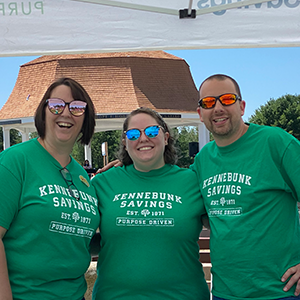Jump to:
What is commercial property insurance?
Commercial property insurance is about protecting your company’s physical assets — we’re talking about walls, floors, fixtures, ceilings, computers, even the sign out front. Find the right policies for your business so you won’t have to pay on your own for damages from fires, wind, hail, or collapse.

Kinds of business property insurance
- Inventory & Contents
- Building or Betterments & Improvements
- Business Income
- Contractor’s or Mobile Equipment
Helpful terms and information
Replacement cost value
The replacement cost value, or RCV, is the cost of replacing a stolen or damaged item with a brand new one.
Actual cash value
Actual cash value, or ACV, refers to the value of a stolen or damaged item with depreciation factors taken into account (i.e. wear and tear).
Deductible
Your deductible is the amount that you are responsible for paying before your insurance kicks in and covers the rest. Choosing your deductible changes your premium — generally speaking, the higher the deductible, the lower the premium!
Blanket coverage
A single limit of coverage that protects you or the assets you own at your location(s) for the total value of all your assets.
Frequently asked questions
How do I decide on the type of property insurance to buy?
It depends on your business, its value, and the type of property you want covered. Here are a few steps we suggest you follow to understand what you might need:
- Take a complete inventory of all your business property.
- Determine all of its value based on replacing it new today.
- Decide items you want insured and what you might be comfortable not insuring.
- Have a conversation with one of our insurance professionals to help guide you through the different types of policies and coverages available to meet your needs.
Next, consider your business situation:
- Are you planning a major expansion?
- Does your inventory have a peak season (like a toy store in December)?
- Does it fluctuate throughout the year (like a clothing store)?
- Does your liability limit meet the requirements of the new contract you just signed?
- Business policies can be adjusted based on your needs. One of our agents can help you as your business changes to ensure your policy continues to provide adequate coverage.
What are some examples of business property coverage other than my building and inventory?
Boiler and Machinery Insurance – You might need this coverage even if you don’t own a boiler. This insurance provides coverage against the sudden and accidental breakdown of various machinery and equipment, including boilers, computer systems, and telephones, and other communication systems. Coverage usually entails reimbursement for property damage, expedited expenses (like transportation charges), and business interruption losses.
Builder’s Risk Coverage – Includes buildings under construction. Coverage can be for either renovations or brand new construction.
Building Ordinance Coverage – In some communities, ordinances require buildings with a specified amount of damage must be completely demolished and rebuilt per current building codes rather than repaired.
Business Interruption Insurance – Covers the loss of profits as a result of damage or loss of business property. You can receive reimbursement for salaries, taxes, rents and other expenses plus net profits that would have been earned during the period of interruption can be included.
Debris Removal Coverage – In the event of a fire or other damaging event, this covers the cost of removing debris before reconstruction.
Glass Coverage – When store windows and plate glass on office fronts break, there’s no need to worry.
Inland Marine – Insurance primarily covers property in transit. For example, you’re covered if you’re transporting goods to a warehouse or a retail store or if other people leave their property on your premises, such as clothes left at a dry cleaning business or an employee’s personal property left in the company locker room.
How much property insurance should I buy?
Each business is different. Check with a Kennebunk Savings Insurance agent and they will be able to help you determine what may be appropriate. A one-person accounting firm requires less insurance than a store with a substantial inventory. But the core needs are usually the same: coverage of business property, sufficient limits of liability that protect the owner and the employees and protection for lost income during a covered claim.
Unique circumstances might vary. For example, a store in a flood-prone area should invest in flood insurance. An accountant at that store might want reconstruction-of-accounts-receivable insurance to cover the loss of accounting records.
Who decides how much my business property is worth?
You can purchase property insurance based on the property’s actual value, replacement cost, or agreed amount. Here are the differences:
Actual Cash Value
The replacement cost of the item minus depreciation. For example, a new desk may cost $3,500. If your 7-year-old desk is damaged in a fire, it might have depreciated 50%. Insurance would pay you $1,750 minus any deductible you might have.
Replacement Coverage
Pays the cost of replacing an item without deducting for depreciation. So, today’s price for a desk of a size and construction similar to the 7-year-old one damaged by fire would determine the amount of compensation. If it costs $3,500 today, that would be the replacement coverage. Keep in mind; you pay any deductible that might apply.
Agreed Amount
You can insure art objects, antiques, and other unique items at an agreed-upon amount. As the business owner, you, the agent and the insurance carrier agree upon an amount to insure the goods for.
Check your policy. If you prefer replacement coverage and don’t already have it, you may be able to add this coverage to your policy. Inflation-guard coverage, which automatically increases your insurance amount by a certain percentage, helps protect against rising construction costs. One of our agents can work with you to determine what might be appropriate for you.
What kinds of losses does business property insurance cover?
Basic property insurance policies generally cover:
- Losses caused by fire or lightning
- The cost of removing property to protect it from further damage
- “Extended perils” windstorm, hail, explosion, riot and civil unrest
- Damage caused by aircraft, automobiles, or vandalism
I just signed a 3-year lease to open my business. Why does my insurance agent want to see my lease?
Your agent needs to review the lease to determine who is responsible for insuring the leased space and to what extent—you or the lessor. This will help us create a policy that meets those requirements and your needs.
Want to talk about your options for commercial property insurance?
You can request a quote now or give us a call to discuss your options at 1-800-794-2941
